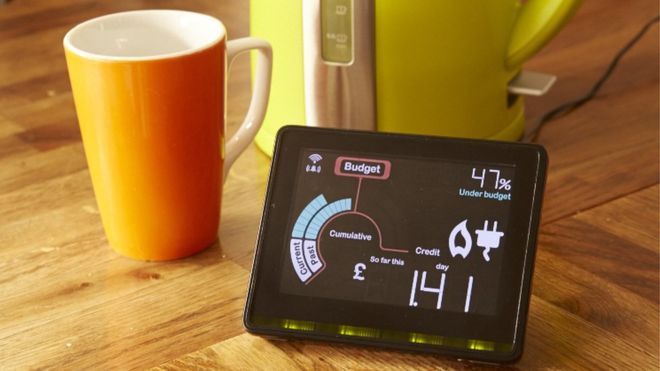A key IT project at the heart of the UK’s national smart meter roll-out programme is facing further delays.
The government has confirmed that the communications infrastructure which links smart meters to energy suppliers will now not be ready until the autumn.
The system was due to be switched on on Wednesday.
The government says the system, which automatically sends meter readings to energy suppliers, is now due to go live at the end of September.
The government wants every home and business to be offered a smart meter by the end of 2020. That requires 53 million meters to be fitted in over 30 million premises over the next four years.
The meters will measure gas and electricity use and automatically send meter readings to energy suppliers, ending manual meter readings.
A new body, the Data and Communications Company (DCC), was set up to create the infrastructure to handle all that information.
Delays
But the huge IT project has suffered a series of delays, much to the dissatisfaction of public assistance service Citizens Advice.
“Smart meters can transform the way people use and pay for their energy,” said Gillian Guy, chief executive of Citizens Advice.
“This is now the third time in 18 months that this IT project has been pushed back and we are concerned that the delay to this important communications system will make it harder to meet the 2020 deadline for the roll-out of smart meters.
“This could make the overall project more expensive and hit consumers with higher bills down the line.
“It’s crucial that the government is clear on whether the compressed timetable for installation will result in additional costs to consumers,” said Ms Guy.
It was originally expected to be operational in 2015. That was put back a year until April 2016 and then further delayed until this August.
As recently as last month, the government told the BBC that the DCC would go live on 17 August.
But the Department of Business, Energy and Industrial Strategy (BEIS) now says that has been delayed until next month at the earliest.
A BEIS spokesperson said: “The new infrastructure is planned to go live at the end of September, it is currently being tested to deliver a long-lasting, world class system to bill payers.”
Many in the industry had expected the switch-on of the DCC to be put back.
But confirmation of the delay was met with exasperation by an insider at one of the big six energy suppliers.
SMART METER COSTS
DCC cost £2.47bn
Total roll-out cost £10.9bn
Total benefits £17bn
Net Benefits £6.2bn
Source: Government/DECC 2014 impact assessment
“It’s yet another delay in what’s been a drawn out and badly managed project that we are rapidly losing confidence in,” he said.
Another industry executive told the BBC that there was increasing dissatisfaction with how the programme had been handled.
“It’s got to be done – we’ve sunk so many millions into it,” he said. “But how good will it be and how reliable will it be?”
He also thinks the 2020 roll-out deadline is looking increasingly unlikely.
“I don’t think anyone seriously thinks that is a realistic proposition,” he said.
Dan Lewis, senior adviser on infrastructure policy at the Institute of Directors, thinks the delay is an opportunity to look at whether the benefits of smart meters outweigh the cost of the roll-out.
“I lost count of the delays to the smart meter programme some time ago,” he said.
“Now more than ever, the new government must assert some leadership over the programme and publish the long overdue impact assessment. It will almost certainly find that in a world of much lower energy prices and endless programme delays, the benefits to consumers are now much lower and the costs substantially higher.”
Setback
The government insists that the delay won’t hold up the roll-out of smart meters. Some 3.6 million have been installed to date in homes and businesses across Britain.
But this latest setback has consequences for any of those households that want to move to a cheaper supplier as they will lose the smart functionality if they switch.
When the DCC system is operating, that will no longer happen. So its a crucial building block of the roll-out programme.
The DCC body is a wholly owned subsidiary of Capita, the outsourcing and business services firm.
While the cause of the latest delay remains unclear a spokesperson for DCC said: “As indicated by the Department, the timetable for the roll-out of the new infrastructure will allow for testing of the system to ensure that it will deliver a long-lasting and effective system.”

